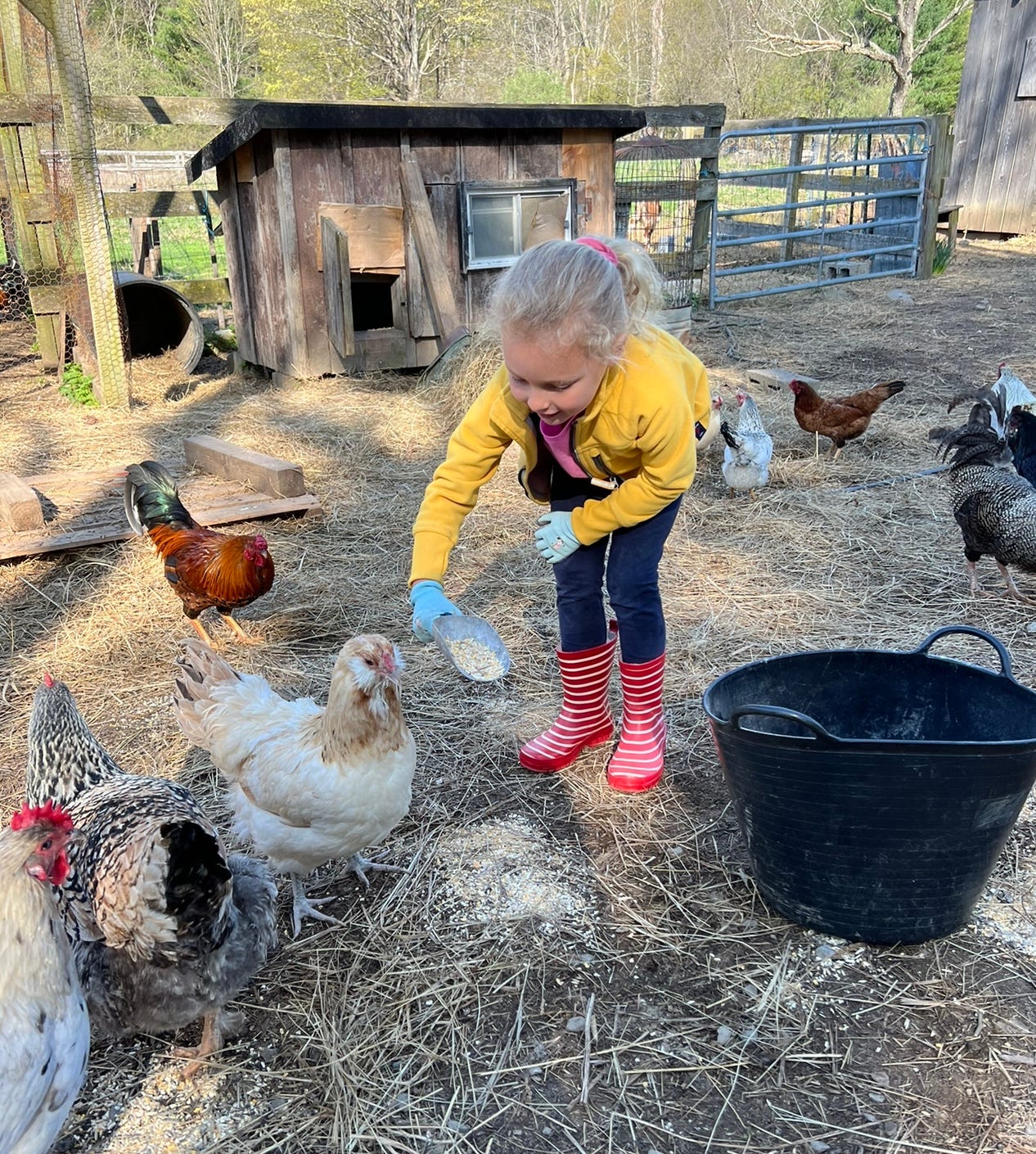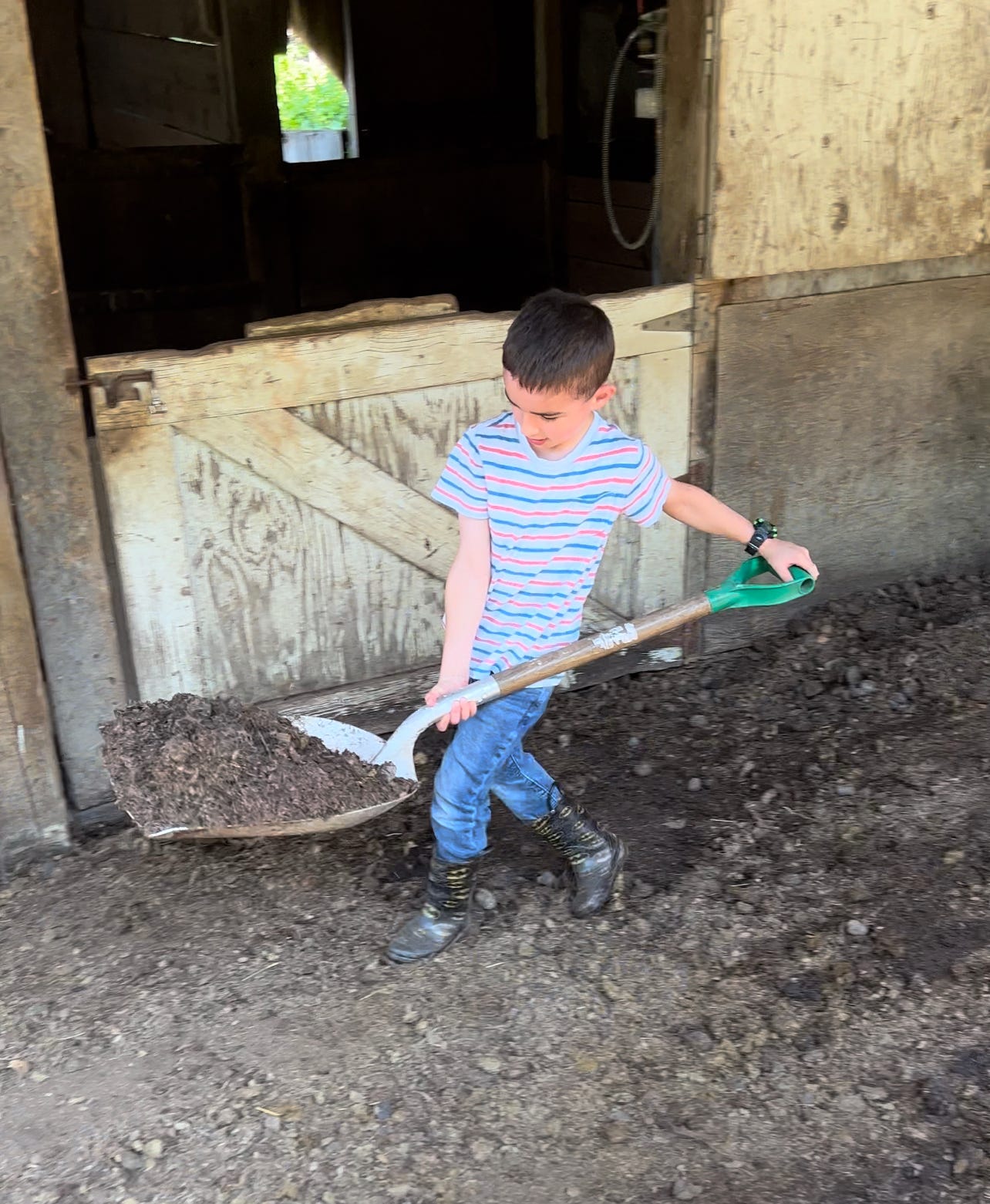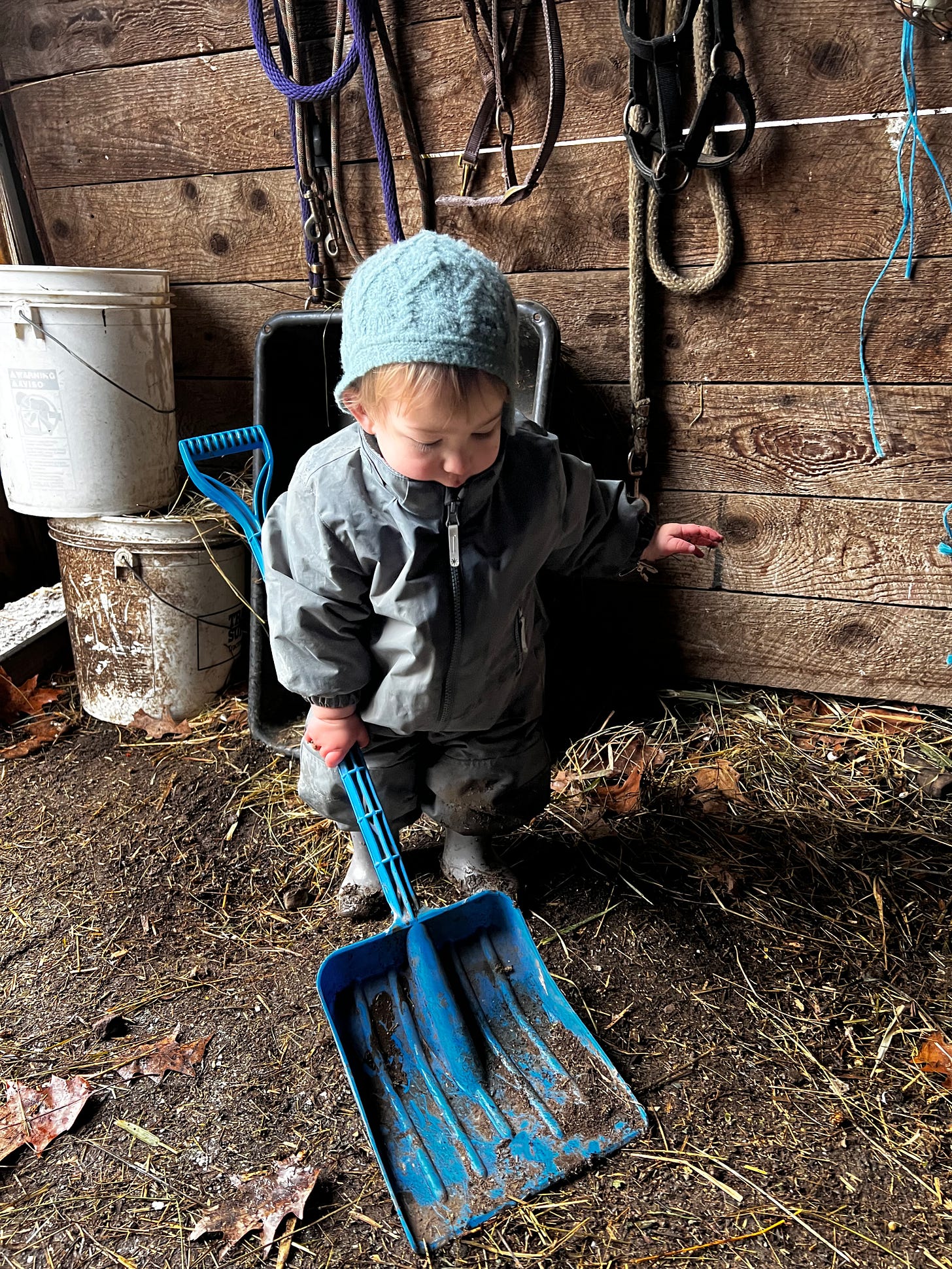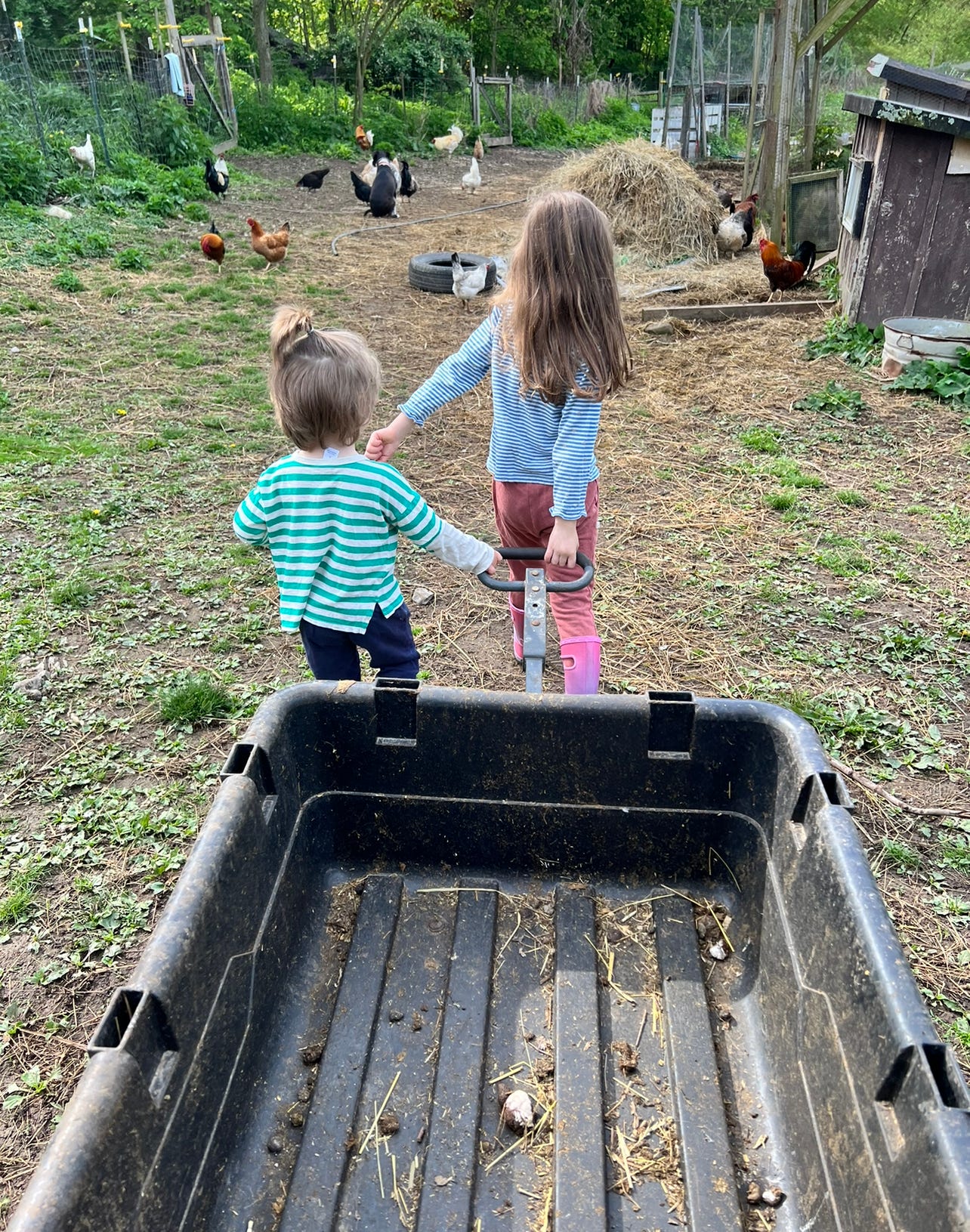The Problem with Poop
A farm holds great possibility for danger: electric fences, wood splinters, overbearing goats, maybe even an aggressive rooster. But the biggest issue for today's kids turns out to be poop.
We start farm camp with an easy chore: feeding corn scratch to the hens. Even a toddler can grab a handful of corn and toss it, and the older kids can handle a metal feed scoop and begin roving further and further from the feed bucket (and their parents).
This is necessary because most visiting kids are a little freaked out at first, or at least unsettled. The chickens are loud and busy, the ponies are glaring at us from the paddock, and the goats are screaming for their breakfast from inside the barn. It’s already a lot. We work our way up to the poop.
“Are we going to have to clean up poop?” an eight-year-old boy asked recently. For some inexplicable reason, his parents had teased him that this was going to happen. His six-year-old brother was equally nervous. (Parents who come to my farm: please don’t tease your children about work they’ll have to do here. It makes my job harder.)
The tradition of sending an urban kid to the country has been around for a long time. Like frail and sour Mary in The Secret Garden (published in 1911), a child sent to the countryside could expect to breathe fresh air, behold a wondrous but unflinching natural world, and be toughened up by the good country people who wouldn’t indulge a sophisticated child’s demands.
I’ve capitalized on this tradition with what I call farm camp. In this set up, families rent my Airbnb cottage and go about typical weekender business: hiking, shopping, grilling in the backyard, lounging in the hammock, etc. In the morning, for an extra fee, they have the option of sending their kids down to the barn for farm camp with me.
This is a two-hour class on farming. For the first hour we feed and care for the animals. In the second hour we have choices. We can do pony rides, wool crafts, bunny time, explore the woods, and so on. Along the way we discuss animals, chicks, insects, goat behavior and even farm economics. The kids learn all kinds of shocking things that until about ten minutes ago in the span of human civilization were completely obvious and known, such as: what happens to our lambs when they mature (they are slaughtered), what a dead animal looks like (for example, when we find a drowned chipmunk in the water trough), how bad the sting from a nettle is (not very), what mating looks like in the chicken world (interpretations vary), and so on. In this venue, dealing with poop is a given. And it’s the hardest thing, requiring the most effort on my part to get the kids on board.
I understand that in the city poop is a big deal and something to be avoided at all costs. I understand that it’s a bit shocking to hear for your entire short life that poop is bad, don’t touch the poop, get away from the poop—and to then come to a farm and be expected to confront the poop in myriad ways.
“That’s poop,” a kid will say, stricken, pointing at a pile of horse manure in the pasture.
“He’s pooping!” they’ll shriek when the goats, who practice elimination almost conversationally, suddenly, casually, emit a tidy cascade of poop pellets while standing right next to us. (In his classic farm memoir Goat Song, Brad Kessler writes, “A goat’s anus would open like the aperture of a camera and produce perfectly round pellets, one by one.” It is in fact sort of a remarkable event.)
But poop on a farm is called manure and it’s an element and a resource and a reality. And if it’s the dried manure of a ruminant like a goat or a pony, it doesn’t smell bad. But try convincing kids of this fact. Even some return visitors will reflexively complain that the dusty pony manure in an open-air paddock is so noxious that they can barely breathe. (For those who don’t know: the odor of fresh horse manure lessens within minutes of arrival into the world, and when it’s dried is totally innocuous and—mingled with other barn smells like saddle leather, spicy hay, and horse sweat—arguably quite pleasant.)
This is not the impression you’d get if you saw first-timer kids. You might see them in the pony paddock ostentatiously holding their noses and wailing that it smells. Or going frozen and freaked out as they encounter dried manure in the pasture that we are walking across. “It smells!” they’ll shout. But it doesn’t smell. Chicken poop and dog poop smell and are gross, which is why I don’t ask kids to help me in those areas. Dessicated pucks of pony manure in the pasture are not worth getting upset over.
Many kids get past it quickly enough that with a little prodding and rational explanations we can keep going. Nearly half take a little longer, and every now and then there’s a kid who just cannot deal with it. In almost all cases this kid is making a point. We host lots of sensorily-sensitive kids, and I can’t think of a single one who couldn’t adapt to this task. The hold-outs are usually showing off for younger siblings, or else they have been so teased by their parents that to give in would feel like a loss. (Again, parents: please don’t do this.)
Most kids come to see the clarity in our poop protocol. I make a big point of keeping the handles of our tools clean, for example, redirecting kids when they just drop a shovel to the ground. (We lean rakes and shovels against the wall so the handles stay clean.) I teach the kids not to hold the dirty end of the tool up in the air. And when there is a fresh, steaming pile of poop that does actually smell, I’ll deal with it. When the kids have hauled the full wagon out to the manure pile, I’ll step in to do the dirty work: pulling the wagon up on to the pile and dumping it. In other words, this is not a punitive or cruel task. I actually think it’s enjoyable; and most kids eventually agree with me. In fact, it’s common to hear kids say it’s their favorite part of farm camp. They feel the satisfaction of getting a job done, and maybe even triumphant that they’ve done something so off-limits in their normal life.
I can’t argue that shoveling pony poop will cure anxiety and depression. Well, maybe I can. I find it immensely satisfying and calming to interact, often through labor, with the land and animals. And I also believe that manual labor is a valuable endeavor on its own merits. It’s the essential value in what I’m offering to these children on these weekends.
Most of these kids will grow up to be professionals, likely in high end jobs. They won’t do manual labor of any kind. They might not have a summer job scooping ice cream or bussing tables. The way things are going, they might not even use a vacuum cleaner or a lawn mover. But I believe there’s dignity inherent in any kind of work, including manual work, and I think it’s worthwhile for the kids to have this experience, now more than ever, in an era when most kids aren’t even asked to take out the garbage or wash the dishes.
Shoveling poop is not as poetic as Dickon teaching Mary to whistle to the birds or as useful as the housemaid insisting Mary learn to dress herself. But our modern dilemmas call for their own remedies. Mucking stalls may be the perfect antidote to our increasingly virtual reality and its attendant anxieties. And besides, it’s just poop. We still have to work our way up to the the talk about where the lamb in our freezer came from.
You can read more about my farm camp in this piece I wrote for the Free Press.








I remember, as a young boy in the 70's, going to my grandfather's farm on weekends and walking through the environs of cows, pigs, horses, and chickens. That world (and its fragrance) is embedded in my memory and is a fond one. So different from the sterilized world of the suburbs. I often think I was born 150 years too late. Farm life would have suited me fine.
I had the same experience when the kids of a former coworker came to visit the donkeys we had at the time... The stepped in the barn - home to horses, cats, donkeys, etc. - and it was the MANURE - that they just couldn't get over! I was so surprised. We are talking about some usual unmucked stalls in the morning, nothing crazy, and my little kids help muck stalls everyday (and play in hay, straw, and yes, have picked up manure whoops, no problem).